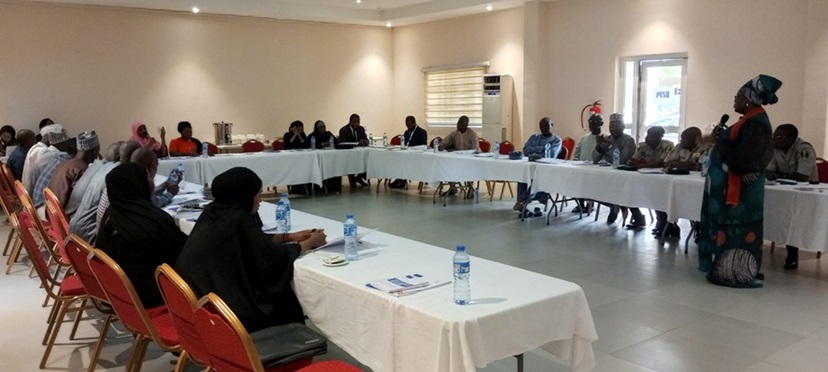Isiyaku Ahmed
To increase awareness of Non-custodial Measures (NCM) in Kano, the Rule of Law and Anti-corruption Program (RoLAC II) funded by the European Union and implemented by the International Institute for Democracy and Electoral Assistance (IDEA) supported a town hall meeting for the dissemination of the NCM strategies across the Justice Sector.
In his opening remarks at the event which was held at BON Hotel, RoLAC II State Program Coordinator, Ibrahim Bello said his organization found it necessary to support the state government and its institutions to lay a good foundation for the future state correctional facility by promoting NCM in the operations of correctional facilities when it comes into operations to avoid the fit falls of rising trend of congestion of the facilities with inmates.
Therefore, the objective of the Town Hall is to deepen stakeholder’s understanding of non-custodial measures such as community services, parole, and suspended sentences.
Bello thanked all stakeholders for coming especially the Deputy Controller of Corrections, the DCR Hugh and the Director of Public Prosecution from the Ministry of Justice, the representatives of the Law Enforcement agencies and Community leaders, Civil Society Organizations, and the Media.
RoLAC II Program Consultant and the Executive Director, Prison Rehabilitation and Welfare Association (PRAWA), Dr. Uju Agomoh, in her presentation, flagged some issues regarding community corrections of NCM, an overview of what the law in Nigerian Looks like, challenges, benefits, rationale for the implementation NCM, and prospects for Kano.
She also talked about actions that need to be taken to enhance the effective implementation of NCM in Kano state.
Dr. Agomoh noted that the concurrent placement of corrections in the constitution gives states including Kano a mandate to play some roles in the management of correctional services.
“The event was meant to let different stakeholders know the role they need to play in supporting the implementation of correctional service reforms and NCM in Kano state,” she added.

Stallion Times reports that Dr. Agomoh has presented the validated draft of the Kano Model State Correctional Service Law to the Attorney General.
Speaking on the gaps in the implementation of NCM, Kano State Director of Public Prosecutions, Salisu Tahir Esq., said: “Though under Administration of Criminal Justice Law, (ACJL), 2019 NCM is not alien its application relies solely on the Judiciary however, the potential gaps that may exist in the implementation of NCM in Kano state may include a lack of awareness and understanding of Non-custodial Measures among law enforcement agencies, judicial officers, and the general public in Kano.
This lack of awareness may lead to underutilization or improper application of NCM.
“There might be a prevalent culture of relying heavily on custodial measures, such as imprisonment, rather than considering or prioritizing non-custodial alternatives. This mindset could result in the underutilization of NCM options.
“Finally, there may be the need to specify the nature of offenses to be placed on NCM.”
On measures that can be used to expand NCM in Kano, the DPP said: “Develop and revise the legal framework to support and encourage the use of non-custodial measures. Ensure that the laws provide clear guidelines for the application, supervision, and monitoring of NCM.
“Conduct awareness campaigns and training programs for justice sector professionals, including judges, lawyers, police officers, probation officers, and correctional staff. It should focus on education, the benefits, procedures, and effective implementation of non-custodial measures.
“And provide adequate resources and support for training programs to enhance the capacity and skills of justice sector professionals responsible for implementing NCM.
The In-charge, of Medium Security Custodial Center (Kano Central), DCC Muazu Tukur, said the NCM has a lot of benefits.”
“There are certain offenses (minor offenses) that are not supposed to be detained in our custody. With the NCM adolescent offenders will be punished using the NCM and society can benefit from him and his wrong actions.
“Such offenders, through the NCM, will be protected from hardened criminals and the community services are more beneficial to the offender and the state.”
Abba Abubakar, a participant from the Ministry of Justice gave his thoughts on the NCM.
“Even though most of the key actors are not utilizing the NCM to the fullest, I believe it is the best measure to decongest custodial centers.
“It will also help to reduce crime in the society as some offenders will rather choose to be detained than be sentenced to non-custodial service.”
Another participant, the District Head of Gandun Albasa, Engr. Alkasim Yakubu said when the NCM is applied properly, many crimes will reduced.
He suggested that community leaders should be a part of the supervisory team of the NCM since the offenders would sentenced to serve or work in communities.

